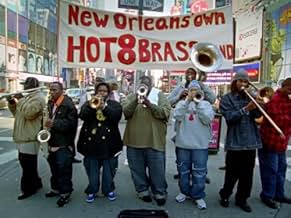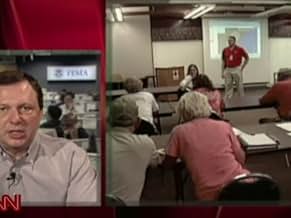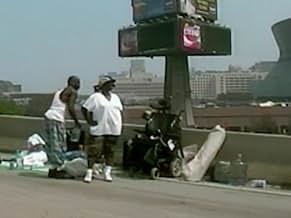Quando gli argini si sono rotti: un requiem in quattro atti
Titolo originale: When the Levees Broke: A Requiem in Four Acts
VALUTAZIONE IMDb
8,5/10
5029
LA TUA VALUTAZIONE
Aggiungi una trama nella tua linguaAn examination of the U.S. government's response to Hurricane Katrina.An examination of the U.S. government's response to Hurricane Katrina.An examination of the U.S. government's response to Hurricane Katrina.
- Vincitore di 3 Primetime Emmy
- 8 vittorie e 9 candidature totali
Sfoglia gli episodi
Recensioni in evidenza
Spike Lee is certainly not correct about levees being blown,but the truth is even worse.He is certainly nearer to the truth than people who blame "the force of the hurricane".As one who rode out both Katrina and Hurricane Betsy in the same house in Gentilly,it was obvious at the time that Katrina was no worse.The lake levees,which were properly built,though exposed to the full force of the storm,came through unscathed.What collapsed and flooded the main part of the city west of the Industrial Canal were those worthless,cracker box,stage-prop "flood walls" along the drainage canals that folded up and collapsed like cheap card tables the minute the water rose.
Besides the Corps of Engineers,we can blame former Mayor "Slimy Sidney" Barthelemy"The Man Who Murdered A City".He deliberately forced out the veteran engineers of the Sewage & Water Board,so that no one would object to those worthless (but profitable) frauds.AND he had the valuable assistance of the alleged "newspaper",the Times Picayune which covered up his criminality. The incompetent stooges that Barthelemy replaced the experienced engineers with not only approved those worthless flood walls that the old engineers knew were disasters waiting to happen,but, still infesting the Sewage & Water Board to this day,insanely dredged the drainage canals in such a way as to remove what little foundations those flood walls had.The 17th St. Canal shows this graphically.This sits astride the parish line.Jefferson Parish engineers refused to allow this lunatic dredging on THEIR side of the canal, which is why only the Orleans side collapsed.A year before Katrina, people living along the drainage canals complained of salt water seeping into their yards, killing plants.To a COMPETENT,HONEST engineer this a clear sign that something was dangerously wrong with the levee foundations.But the Barthelemy "engineers" swept it under the rug,telling people that they were "imagining things".
And as for blaming those who wouldn't evacuate,If one thing was proved, it is that evacuating a city this size IS NOT PRACTICAL.New Orleans could and should have been an impregnable fortress against hurricanes.The vast bulk of the misery caused by Barthelemy's Flood was the destruction of the homes,and LIVES of the "survivors",who now have to live,or rather EXIST in this horror.The empty city was picked clean by looters despite the presence of thousands of police and National Guard,which shows that it is the PEOPLE who are the real crime deterrents.Telling people,"Get out, let the hurricane and the looters destroy your homes and businesses,and we will give you sardine can trailers to live in" is typical of the garbage we hear from the government.
Besides the Corps of Engineers,we can blame former Mayor "Slimy Sidney" Barthelemy"The Man Who Murdered A City".He deliberately forced out the veteran engineers of the Sewage & Water Board,so that no one would object to those worthless (but profitable) frauds.AND he had the valuable assistance of the alleged "newspaper",the Times Picayune which covered up his criminality. The incompetent stooges that Barthelemy replaced the experienced engineers with not only approved those worthless flood walls that the old engineers knew were disasters waiting to happen,but, still infesting the Sewage & Water Board to this day,insanely dredged the drainage canals in such a way as to remove what little foundations those flood walls had.The 17th St. Canal shows this graphically.This sits astride the parish line.Jefferson Parish engineers refused to allow this lunatic dredging on THEIR side of the canal, which is why only the Orleans side collapsed.A year before Katrina, people living along the drainage canals complained of salt water seeping into their yards, killing plants.To a COMPETENT,HONEST engineer this a clear sign that something was dangerously wrong with the levee foundations.But the Barthelemy "engineers" swept it under the rug,telling people that they were "imagining things".
And as for blaming those who wouldn't evacuate,If one thing was proved, it is that evacuating a city this size IS NOT PRACTICAL.New Orleans could and should have been an impregnable fortress against hurricanes.The vast bulk of the misery caused by Barthelemy's Flood was the destruction of the homes,and LIVES of the "survivors",who now have to live,or rather EXIST in this horror.The empty city was picked clean by looters despite the presence of thousands of police and National Guard,which shows that it is the PEOPLE who are the real crime deterrents.Telling people,"Get out, let the hurricane and the looters destroy your homes and businesses,and we will give you sardine can trailers to live in" is typical of the garbage we hear from the government.
10dave1606
Spike Lee's film When the Levees Broke: A Requim in Four acts is a haunting look at New Orleans during and after the devastation of Katrina. But this documentary is quick to point out that the disaster was not really from nature at all, it came directly from our own government, from the army core of engineers' poor construction of the Levees to the complete breakdown of the federal government and FEMA's lack buster response. This is not easy to watch as you see just how people's lives were devastated. It is angering, saddening, and also hopeful that New Orleans will be rebuilt and that there is progress made. I liked how it does not point blame in one direction. Everyone is at fault here though some more than others. Seeing the picture of Dick Chenney fly fishing days after the disaster and Condaliza Rice buying shoes in NYC were certainly angering but also watching the governor of Lousiana refuse help from our president are standouts. However the real star of this documentary are the people of New Orleans. They talk freely and angrily about the pain that they have gone through and show that the storm didn't end last August, its still going on there to this day. It is unbelievable to watch as these people wait 4 months and longer for FEMA trailers, and when they get them to find that there is no electricity. When asked what she could do to get electricity one woman suggests a blow-job. It just shows the complete lack of support our government gave to this state and to this city. This film will move you to tears many times and is hard to take but it is necessary to watch . It features a superb score by Terrance Blanchard whose own family was devastated by Katrina as shown on film. An excellent documentary.
10khereth
By far and away the best documentary on Katrina and what happened to the people of my home, New Orleans. It captures the anger, the despair, the fear, and the humanity of our country's greatest disaster. I still cry when I see my city under water. I cry even more knowing others did not receive equal assistance because of the color of their skin. I was concerned that Spike Lee would put his spin on this tragedy, but he has done the opposite. He allows citizens from all over the city, economic and racial backgrounds to tell the real story. He gives a fair and balanced perspective on how all levels of our government failed the people of New Olreans and a good portion of the Gulf Region. I only hope that Mr. Lee comes back in a few years to film another documentary, "The City New Orleanians Re-Built".
Thank you Spike and all the people at 40 Acres and a Mule for doing what had to be done - recording the real story. I see heaps of Emmys.
Thank you Spike and all the people at 40 Acres and a Mule for doing what had to be done - recording the real story. I see heaps of Emmys.
A requiem is a service intended to express the emotions and beliefs of the survivors at the death of a loved one. A requiem is not an autopsy to determine the cause of death, and if Spike Lee intended a requiem, I think he has succeeded. Criticism that this film is not analytical and precise is actually a complaint that this was not an autopsy--but none was intended.
One day a documentary may be made which closely follows the chronology of the storm and the failure of the levees. A documentary may more closely focus on the devastation of the Mississippi Gulf Coast, and the equally shameful failure of government to deal with the problem there. A documentary may be made which focuses on how daily life has changed for those of us who survived. I don't think Spike Lee intended to cover all of those points. The points he did address were very well presented.
The film is outstanding at communicating the grief, suffering and frustrations of the persons shown in the film. It is a very moving expression of emotion and belief, which is the purpose of a requiem.
I don't think the lack of government response is simply and solely attributable to racism, but that may be because I am white. In the film, that opinion was frequently expressed, but I also note that there were also some opinions expressed about the levees being intentionally dynamited. I think Spike Lee undercut the impact of his major premise by including a rumor that seems similar to the myths of Bigfoot or Elvis being alive.
I think the gross government ineptitude, inertia and political games are all well-documented, and the bottom line is that those persons who were financially able to take care of themselves fared better than those who were not--it's a matter of class and wealth, and not so much a matter of race.
In yesterday's news, it was noted that Congress earlier appropriated $17 billion to build new houses in the affected areas, and that as of this date (August 22, 2006), not a single house has been built with that money in either Louisiana or Mississippi.
One day a documentary may be made which closely follows the chronology of the storm and the failure of the levees. A documentary may more closely focus on the devastation of the Mississippi Gulf Coast, and the equally shameful failure of government to deal with the problem there. A documentary may be made which focuses on how daily life has changed for those of us who survived. I don't think Spike Lee intended to cover all of those points. The points he did address were very well presented.
The film is outstanding at communicating the grief, suffering and frustrations of the persons shown in the film. It is a very moving expression of emotion and belief, which is the purpose of a requiem.
I don't think the lack of government response is simply and solely attributable to racism, but that may be because I am white. In the film, that opinion was frequently expressed, but I also note that there were also some opinions expressed about the levees being intentionally dynamited. I think Spike Lee undercut the impact of his major premise by including a rumor that seems similar to the myths of Bigfoot or Elvis being alive.
I think the gross government ineptitude, inertia and political games are all well-documented, and the bottom line is that those persons who were financially able to take care of themselves fared better than those who were not--it's a matter of class and wealth, and not so much a matter of race.
In yesterday's news, it was noted that Congress earlier appropriated $17 billion to build new houses in the affected areas, and that as of this date (August 22, 2006), not a single house has been built with that money in either Louisiana or Mississippi.
After seeing this movie, I feel completely betrayed by the United States government and the government of Louisiana. I am from a town right outside of New Orleans (on the Northshore of Lake Pontchatrain) and my town endured much devastation and many people lost their lives. I think that this movie is a great opportunity for Spike Lee to show everyone in the United States that Hurricane Katrina still haunts the lives that it affected 1 year ago, including myself. Many people do not understand the magnitude of this storm and until you smell it, see it in person, and live it YOU WILL NEVER UNDERSTAND. To see the vice president fishing, and Rice shopping in New York just days after the devastation is very unwelcoming but sometimes I believe that at one point, there was nothing that could be done because this country was not ready for a hurricane like this and they never did expect it. But indeed, this movie can give a person a slim sense of what we endured. THe graphics were horrible and very graphic but they were a good touch as to visual understanding of the situation. Many rumors are still circulating about this storm but in my opinion, they will never really get to the end of it. The storm is over and there is no turning back time so pointing fingers is a waste of time. I believe the government needs to focus on the future and the rebuilding process of New Orleans and the other areas who were severely devastated. I give this movie 2 thumbs up because having witnessed the devastation first hand I believe Spike Lee did an extraordinary job to create a documentary that covers all aspects of this storm.
Lo sapevi?
- QuizThe score for When the Levees Broke was re-used in the 2018 Spike Lee Joint BlackKklansman.
- ConnessioniFeatured in 50 Documentaries to See Before You Die: Episode 1 (2011)
I più visti
Accedi per valutare e creare un elenco di titoli salvati per ottenere consigli personalizzati
Dettagli
- Data di uscita
- Paese di origine
- Sito ufficiale
- Lingua
- Celebre anche come
- Cuando se rompieron los diques: Réquiem en cuatro actos
- Luoghi delle riprese
- Aziende produttrici
- Vedi altri crediti dell’azienda su IMDbPro
- Tempo di esecuzione51 minuti
- Colore
- Mix di suoni
- Proporzioni
- 1.78 : 1
Contribuisci a questa pagina
Suggerisci una modifica o aggiungi i contenuti mancanti

Divario superiore
What is the Spanish language plot outline for Quando gli argini si sono rotti: un requiem in quattro atti (2006)?
Rispondi






















